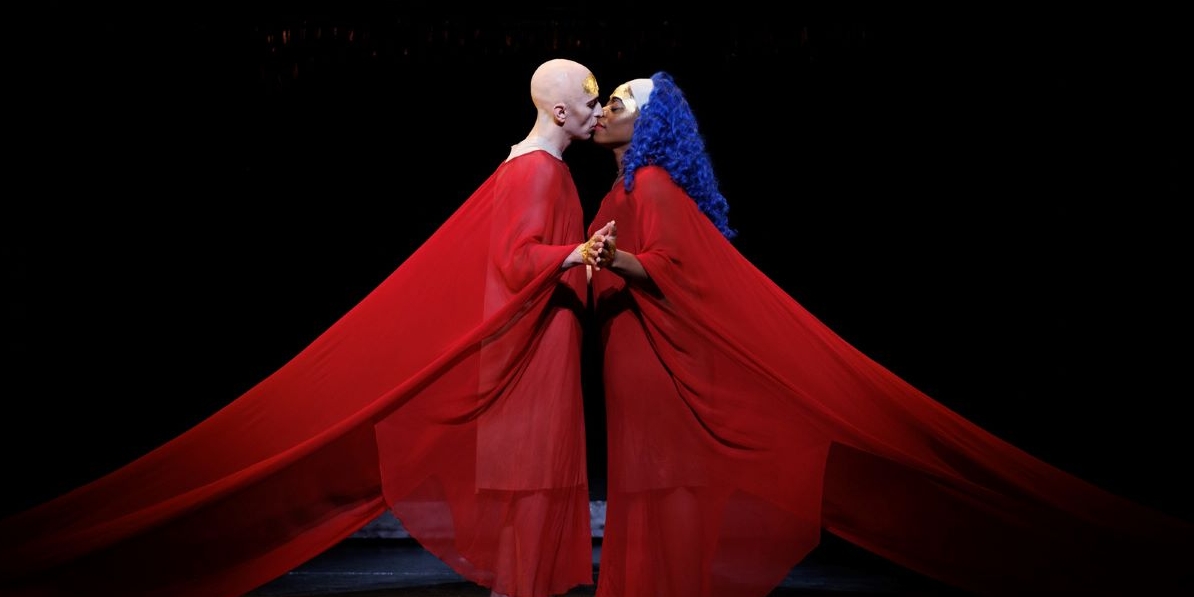‘Akhnaten’ is the third of Philip Glass’s operas that offer portraits of historical figures significant in the fields of science (Einstein), politics (Gandhi), and – in this case – religion. Akhnaten was the disruptive Egyptian pharaoh credited with first recorded attempt to introduce monotheism (in this case worship of the sun god, Aten) before the forces of polytheism regrouped and overthrew him and effectively erased his memory. This production, garlanded with praise when it first appeared in 2016, now returns to the Coliseum with Anthony Roth Costanzo in the title role once again. How well has it aged?
This is a very different and darker sound world from Glass’s other operas. There are no violins, thus lending prominence to lower strings, woodwind, brass and percussion, appropriate to the dominant dramatic themes of public ceremony and stately ritual. There is also an abundance of spoken material that intensifies the incantatory formality of the work. ‘Minimalist’ is, as ever, a misleading term for the musical style in which musical layers are built up out of simple motives to create complex vocal and instrumental structure of great cumulative and – at points – overwhelming power. However, the scenarios assigned to these elaborate tableaus are relatively underdefined, which gives great scope to the director and cast to shape the final result. It is the defining skill of this production that Phelim McDermott and his team have done so in a way that uses design, lighting, costume and make-up to create a unique vision of the piece. They have released the full power of the music with visual correlates that linger long on the retina and which you can hardly imagine otherwise once seen.
In the pit Karen Kamensek finds the widest dynamic range which gives scope for Glass’s climaxes to build gradually yet remorselessly while offering support and space for the singers, balancing the contribution of each component part. For much of the action the set operates on three levels to best display the full forces involved in the funeral and coronation scenes. These forces include a strong showing from the ENO chorus, and a notable contribution from Gandini Juggling, a troupe of jugglers and acrobats now well known for their frequent interventions in the world of classical music. Far from being merely decorative and ornamental, their work is an important intensifier of mood, whether joyful or anguished.
Anthony Roth Costanzo’s defining performance of the title role, both other-worldly and vulnerable, is as arresting as before. He is well matched by the rich velvety tone of Chrystal E Williams as Nefertiti, with their duet of counter-tenor and alto standing out as a masterly incarnation of the merging of the masculine and feminine that lies at the heart of the action and argument. Haegee Lee, as Queen Ty, Akhnaten’s mother, provides a brightly imperious soprano as contrast and the voices of conservative priestly opposition are well taken by Paul Curievici, Jolyon Loy, and Benson Wilson. Zachary James reprises the spoken narrator’s role of the Scribe with the right blend of gravitas and understated empathy.
In a short review such as this there is rarely space to do justice to the creative team responsible for lighting, costumes, and make-up; but here it would be a travesty if they did not receive a major credit. With the deliberately slow and ritualistic delivery of the action so dominant, for balance there must be continual visual fascination. This comes in the form of an exquisitely considered yet quirky colour palette, refulgently lavish yet historically informed costumes, and make-up that combines both delicacy and alien primitivism. Just as in Christopher Lloyd’s garden at Great Dixter, outrageous colour combinations that should not work, such as orange and blue in the ‘Hymn to the Sun’, embody Akhenaten’s mission of beauty and daring in a series of arresting, startlingly distinctive realisations.
Glass’s work is often considered a corpus apart in a world of its own aesthetic ingenuity. But this opera reminds you strongly at points of other classic works – the very opening echoing the gathering rippling force of the prelude to ‘Rhinegold’ that we heard just recently at the Coliseum; and the stately ceremony nodding pointedly in both debt and differentiation towards ‘Aida’, that other great invocation of Egyptian otherness. But if this magnificent work and production do build on the classics of the past that in turn is only a recognition of how originality is necessarily a product of both reflection on tradition and the courage and decisive will power needed to move beyond it. A courage exemplified in both the story and the creator of this ever-fascinating modern masterpiece.

